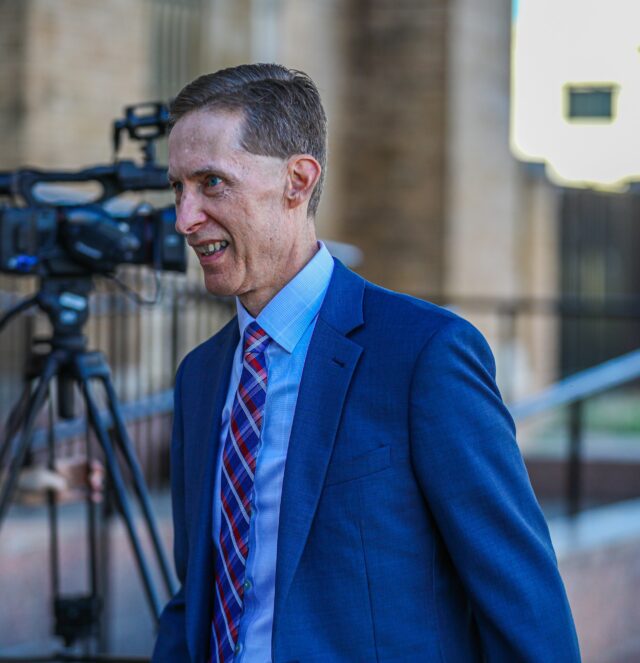By Jenna Fitzgerald | Editor-in-Chief
Judge Robert Pitman dismissed former head football coach Art Briles and former athletic director Ian McCaw from the lawsuit Friday, saying the plaintiff did not prove their case against them and “no reasonable jury” could conclude the two men were negligent.
Pitman also dismissed the gross negligence claims against Baylor, but the Title IX and negligence claims against Baylor still stand. He also noted that “the testimony of Art Briles and Ian McCaw is still admissible in this case.”
The plaintiff, former Baylor student Dolores Lozano, filed the lawsuit against Briles, McCaw and the university in 2016. Her complaint was a domestic violence matter from 2014 regarding three alleged instances of physical assault by her ex-boyfriend, former Baylor football player Devin Chafin. She claimed that the campus culture created a heightened risk for her assault and that coaches and employees failed to properly respond to her reports.

Following the announcement, Baylor called its only witness to the stand. Dr. Jeff Temple is a licensed psychologist, a chair at the University of Texas Medical Branch and the founding director of the Center for Violence Prevention. He said he is “the most published researcher in the world” on dating violence, with over 250 scholarly publications and more than 180 that are peer-reviewed.
Baylor hired Temple to do an evaluation of Lozano in 2021. In the course of this process, he met with Lozano, conducted hours of testing and reviewed many documents, including emails, text messages, depositions, medical records and the entirety of therapy records. He also examined the report of Dr. Julia Babcock — a psychologist who was hired by the plaintiff to do an evaluation of Lozano in the same year.
On Wednesday, Babcock testified that Lozano had PTSD as a result of the first alleged assault by Chafin. She also said she conducted tests to prove that Lozano was not malingering, or faking, the situation and that Lozano’s trauma was exacerbated by Baylor’s “institutional betrayal.”
Under questioning from Baylor attorney Lisa Brown, Temple discussed the validity of certain tests used by Babcock. He said the M-FAST test, which detects malingering, is “just flat out not a good test.”
“It has a lot of false positives and a lot of false negatives,” Temple said. “It’s rarely used. It’s certainly not used as a standalone measure.”
Temple also said the IBQ.2 test, which analyzes institutional betrayal, is unreliable.
“From a forensic standpoint, it’s just not a good measure because it’s what we call ‘face valid,’” Temple said. “If you’re taking it and you know what you want to report, you can game it.”
In the course of conducting his own tests on Lozano, Temple said he noticed “highly inconsistent responding and potential for exaggeration.”
“We know from Ms. Lozano’s record that she unfortunately experienced multiple traumas,” Temple said. “It’s impossible to say whether or not the results of one trauma were different from the results of another trauma.”
Although he said Babcock probably made a pretty good assessment with the information she had available, Temple said he “did not pick up on institutional betrayal.”
“When I looked at everything, … it looks like when [Lozano] did have those sort of touchpoints, they seemed to be handled appropriately,” Temple said. “When someone comes and reports to us, we don’t want to react immediately. She was not in immediate danger or fearing for her life. When it’s not like that, we want to give the victim agency and power: Respond appropriately, but let her make the first move.”
During cross-examination by Lozano’s attorney Zeke Fortenberry, Temple agreed that Babcock is a qualified psychologist. When asked if the tests Babcock did were acceptable within their field of study, Temple responded with “most of them.”
However, Temple maintained that the test for institutional betrayal is not good, and he noted there is not currently much data on the impact of institutional betrayal on mental anguish.
“I would say that the so-to-speak ‘jury’ is still out on that in terms of how it affects someone’s mental health and day-to-day well-being,” Temple said. “Do I think it’s important from a general standpoint? Yes.”
Temple concurred that Lozano likely requires therapy as a result of multiple traumas.
“She’s experienced several traumas,” Temple said. “She does tend to have difficulty regulating her emotions and tends to have intense and volatile relationships. … I think she would benefit from cognitive behavioral therapy. … I’m biased. I’m a psychologist. I think everyone does [need therapy].”
Pitman dismissed the jury for the weekend shortly after noon Friday so the attorneys could conduct their formal charge conference. Proceedings will resume at 10 a.m. Monday with closing arguments.





